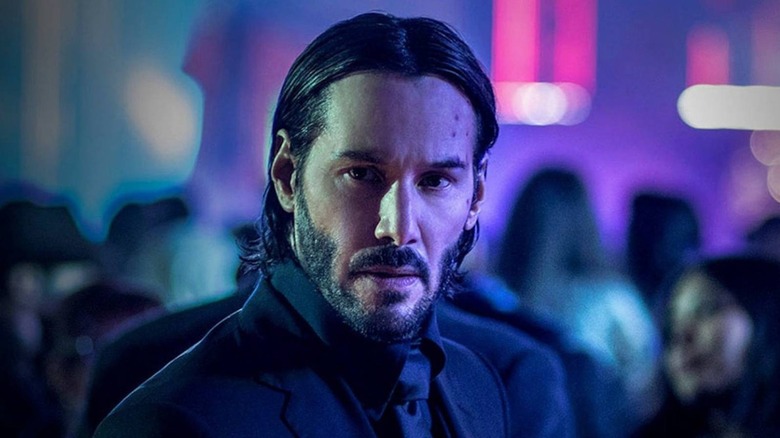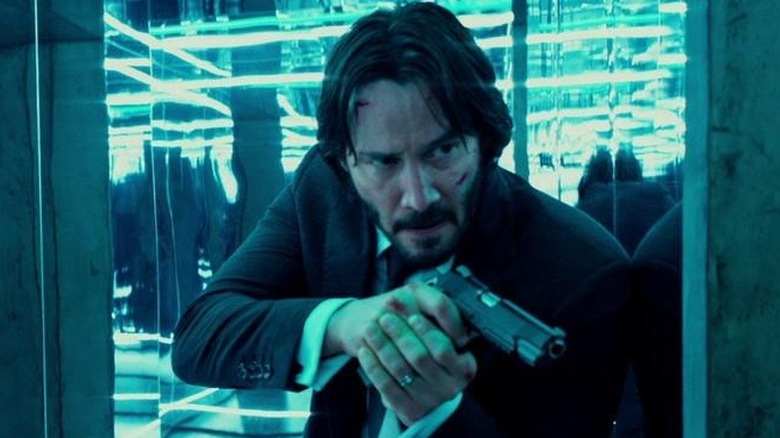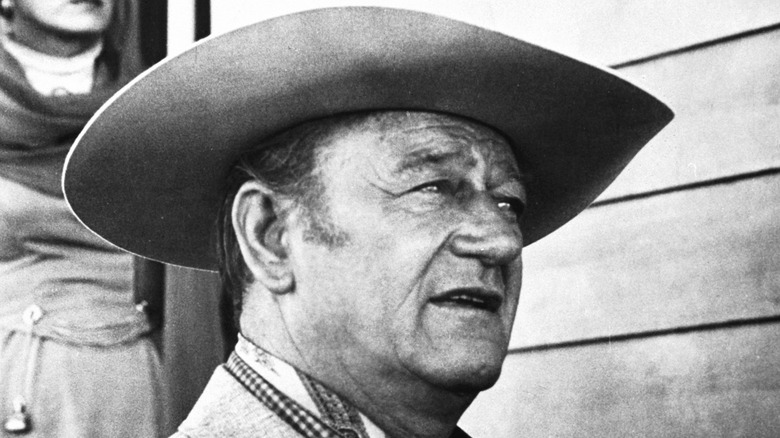If It Weren't For John Wayne, We Might Not Have John Wick
If you've ever seen a "John Wick" movie, you know that the titular character, played by Keanu Reeves, is the epitome of a cool lone wolf. He might be cautious, but he's also self-reliant and willing to get his hands dirty — all of which are easier to expect from Wick's character given Reeves' age. Yet even though the John Wick franchise is one of the most popular recent action series, with its latest installment having grossed over $326 million worldwide (via Box Office Mojo), the iconic hero might not have existed without the legacy of Western star John Wayne.
As the face of numerous American Westerns — and arguably the entire genre — John Wayne always seemed to play self-sufficient characters who could navigate the challenges of the American Frontier. While they may have made alliances or rescued heroines, John's characters rarely found companionship or fit into settler communities. Like Wick, they were loners at heart. Ultimately, these characters became such a popular type (and Westerns, as a whole, were so successful) that they influenced numerous filmmakers going forward, including John Wick screenwriter Derek Kolstad.
Kolstad's ideal hero
In an interview with Dianne Bennett, Derek Kolstad shared some insights into his decision to make Wick an older character. While discussing his appreciation of Westerns, Kolstad noted that "the young guy always gets his backside handed to him. The old guy seems like a cynic, but he isn't. He sees himself; he can be outside of time. He can ignore technology." In other words, youth leads to cockiness — a potentially fatal flaw that both Wayne and Wick are old (and wise) enough to evade.
Within his own blockbuster, Kolstad also noted that the Continental administration's retro technology allows viewers to "think how vast the world is. These systems have been in place for a long time." Although John Wick might be living in the 21st century, he, like John Wayne, must make his way through long-standing structures that are indifferent to his survival. In the grand scheme of things, both Johns are little more than specks of sand — a fact that motivates them towards self-preservation.
Wayne started it all
In the same interview, Kolstad shares that he admires "Die Hard" and "Point Blank" for their focus on determined characters rather than fancy gadgets. But as it turns out, John Wayne significantly influenced both of these films.
Simply in terms of conflict, "Die Hard" and "Point Blank" both feature lone protagonists who must struggle against hostile, coordinated, overwhelming forces that they do not fully understand — much like the hostility that Wayne's characters experienced time and time again on the frontier. Yet the DNA of Wayne's Westerns runs much deeper. In "Die Hard," hero John McClane spews endless cowboy-inspired phrases as he wanders solo through an unpredictable, dangerous environment — practically an 80s update of Wayne's classic formula. Likewise, villain Hans Gruber warns him that "[t]his time John Wayne does not walk off into the sunset with Grace Kelly" (via IMDb), a clear reference to the iconic films. Iconic Western star Clint Eastwood was even almost cast as John McClane. And while "Point Blank" is more neo-noir than Western, it still features a hypermasculine lone wolf who is double-crossed by those he trusts most — including his own wife — and sets out to defend his honor.
Sure, John Wayne's characters weren't the first to face betrayal or become lone wolves. But his popularity made the character type a staple, and as the decades have progressed, each new iconic iteration — whether McClane or Wick — builds upon Wayne's legacy.


